So, how does ADHD intersect with sex and love addiction?
Uh oh, this is a pretty broad topic. What if there are too many threads? Am I supposed to talk about the brain? I don’t understand the brain. How am I even qualified to discuss this!? Okay, this is too overwhelming. Looks like I won’t be making my (completely optional, self-imposed) deadline for this post. Wow, what if I never complete any piece of writing again? How have I still not finished my fucking book proposal? Ya know what? *shuts computer screen* Maybe I’ll just [check in on my partner/go on a dating app/text my crush instead].
Oh right. The through-line. And we’re back.
In Scattered Minds (1999), Gabor Maté says that Attention-Deficit [Hyperactivity] Disorder is marked by some combination of poor attention skills, deficient impulse control and hyperactivity. Paradoxically, many folks with ADHD may also engage in “compulsive, hyperconcentrated attention” (14) and could find themselves freezing more than they are outwardly hyperactive. In fact, hyperactivity may present in forms “not readily obvious to the observer,” such as finger tapping and chewing the inside of one’s mouth (15). Complex indeed!
ADHD is a condition that falls under the umbrella of neurodivergence along with other processing types like autism and OCD (obsessive-compulsive disorder); a nuanced experience that can look like, and overlap with, many other disorders, such as anxiety and C-PTSD (complex trauma). I’m still learning about the various ways my own ADHD can show up—whether a help, a hindrance, or just a silly quirk—and obviously I still haven’t finished any of the books I started reading about it. Luckily, at one time the hyperfocus wing of my ADHD gave me a surge of excitement to write about how this condition intersects with sex and love addiction.
Both ADHD and patterns of addiction are influenced in part by brain structure and genetics as well as environmental factors, including how we were raised and what types of coping skills we’ve learned (or haven’t). There are suggestions that ADHD is related in part to a person’s ability to transmit dopamine, a chemical that is commonly present not only in various forms of addiction but specifically in experiences of fantasy, sex, and limerence. Furthermore, there seems to be a significant overlap in these conditions marked by pleasure-seeking, emotional dysregulation, perfectionism, hyperfixation, fears of abandonment, and poor impulse control.
Perhaps this is why I’ve found so many of my love addicted peers to also struggle with ADHD! And similar to my self-realizations of sex and love addiction, once I saw myself in the fidgety hands of ADHD, I couldn’t unsee it.
I sometimes make art with my lovely friend Cea, who is neurodivergent in a handful of special ways, including most types of ADHD. She’s brilliant at chess and remembering facts about San Francisco’s ancient water systems but often forgets appointment times and where she was going with that thought.
During our first year of friendship, we often found ourselves body doubling, though neither of us realized that what we were doing was a known strategy for boosting productivity in folks with ADHD. In essence, having another person’s mere presence allows ease for someone to get things done, and vice versa. I’d go over to her house to edit my book while she found the fortitude to take out her overflowing trash and recycling.
“Ugh, taking out the trash gives me gender dysphoria,” she said, hands at her hips while she stared blankly at the bins, her nemesis, as I cheered her on from the couch, sometimes encouraging her to take out her recycling in a dress.
On other days, I’d read a choppy passage of In Waves to her while she worked on drawing nude figures with a Sharpie. We were both practicing being imperfect with our crafts and letting ourselves be seen. Of course, the deep shame of our imperfection was another tell of our respective disorders.
On the days we’d paint together, it might take me an hour or two of talking out my inner critic before I could finally pick up a brush and dip it in the water cup. I almost always needed music, but not just any music, only my pre-approved comfort songs could do the trick. AKA Beyoncé. While folks with ADHD may feel most alive with the stimulation of newness, we can also become easily overwhelmed—thus, finding regulation from the familiarity of certain places, clothes, foods, and auditory companions.
And ya know what else can provide comfort? Returning to the soothing hit of romantic intrigue and sexual fantasy. More on that later.
On one such day with Cea, deep into my routine of stalling and stressing, threatening to throw out all of my half-done paintings, I finally conceded—reminding myself this was just for fun and that nothing really matters anyway! Instead of fearing failure as an amateur painter, I focused instead on creating an outlandish mix of colors for the sunset in a Santa Barbara skyline. While Beyoncé sang about being “Cozy” with herself, I bopped along, paintbrush dancing with her words as I blended blues and pinks into splashes of orange and yellow.
Finally in my groove (and nearing “Virgo’s Groove”), I started reflecting on my incredible difficulty with getting started. A writer-friend had recently suggested I have ADHD, which was a shocking possibility for a therapist who hoped to know everything about herself and of course had severe oversights.
“Cea, I think I might have ADHD,” I said, stripes of lavender and indigo already covering my hands and phone. Finally, I had stopped trying to be tidy and careful.
Engrossed in her project, Cea didn’t look up but replied: “Oh yeah, I thought you knew that already.”
What? I was shocked. I mean, if Cea thinks I have ADHD…
“Also, your coffee is still in the microwave,” she said, shading the curves of her figure’s belly.
Ah yes, the coffee I heated up three times and just left there to get cold again.
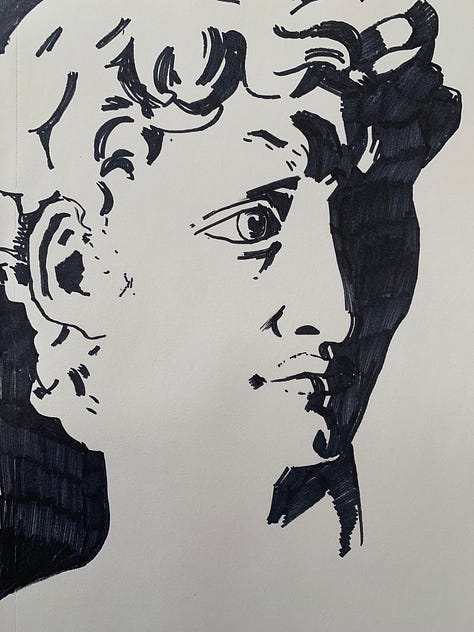
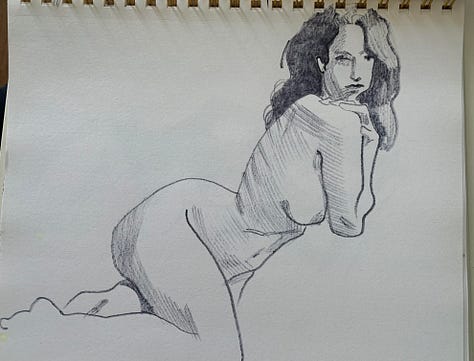
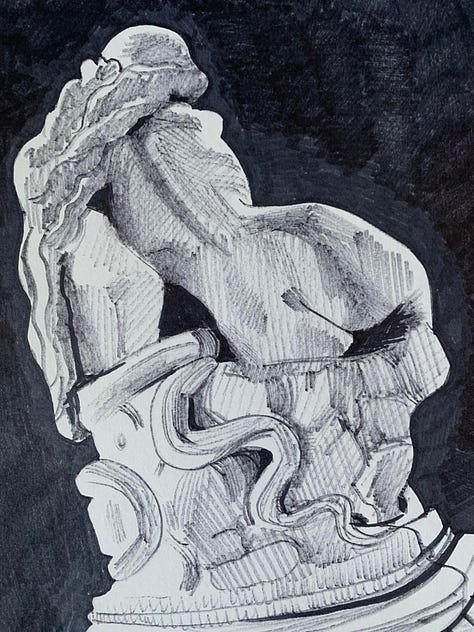
It all started to make sense: getting so swept up in projects that it was 5pm and we still hadn’t eaten, my difficulty with sitting still for long, my propensity towards interrupting people, and my inability to listen to anything but the Renaissance album during 2022 and most of 2023.
Oh, and then my complete unraveling during the pandemic, which led to an unprecedented spike in acting out, sending nudes to half of the UK (and some of Australia), because what else was I supposed to do when our lives were filled with unknown and novelty as we knew it ceased to exist!?
In the words of Taylor Swift, “if you never saved me from boredom, I could’ve gone on like I was.”
I started putting pieces together from my childhood, too: the fact that it was impossible to get my attention once I was engrossed in the misogynistic plotlines of Saved By the Bell; that I couldn’t complete a single piece of required reading during high school; also, my persistent rejection sensitivity and frustration with any new activity where I didn’t have immediate mastery.
Because my ADHD often takes on a hyperfocus flavor, attention isn’t a problem if I’m into something. In fact, if I’m into it, I’m REALLY into it. And if I’m into a person… you can only imagine. A new love interest could be akin to a favorite hobby; I won’t rest until I know everything this person likes, if I’ve been texting too much or too little, and how their astrological placements might fit my fantasy. Maybe I should bring them up to my therapist again!
Again, the overlaps are vast and intricate, so I can only touch on a few. It’s not just that ADHD ruminations can easily latch on to people-obsessions, but that fantasy is an easily accessible mode of self-soothing when self-soothing might otherwise be difficult.
In The Molecule of More (2018), Lieberman and Long write that it can be “difficult for dopamine-driven people to let the [here and now] take over during sex,” as it is “a challenge to turn off their thoughts and just experience the sensations of intimacy” (21). In other words, avoiding being present for intimacy, or leaning into hypesexuality, can potentially be viewed as an ADHD response. And of course, challenges with actual intimacy are a major marker of sex and love addiction.
ADHD is often well-masked and relational addictions are often socially supported, meaning it may be easy to miss presentations of both, or when one bleeds into the other. ADHD traits like time-blindness are often shrugged off as carelessness or laziness, and people may adapt their responses to fit social cues, developing perfectionist, people-pleasing tendencies to compensate for our difficulties, and finding ways of expressing motor agitation that will be hidden to others. Inundated with music and movies that promote distracting, all-encompassing types of love, it makes sense to sublimate the urge to be swept away to the realm of obsessive romance and compulsory partnership.
I’m a Pisces so I’m hardwired to endorse big feelings and passionate love. That said, when feeding our desire circuits is the driving force for having intimate relationships, we can easily slip into patterns of addiction, seeing people as mere fixes for our discomfort with the mundane. We do need a fair amount of dopamine in order to feel “good,” but at the same time, if we base our lives around this pursuit then we are in a constant state of seeking, missing out on the present moment, and, essentially, our true selves.
One of the SLAA recovery “Promises” states: Love will be a committed, thoughtful decision rather than a feeling by which we are overwhelmed.
Okay! A twist.
For some, a life without intensity can feel unbearable, especially if chaos reflects our brain state, or offers the comforting familiarity of one’s upbringing. On the other hand, a lack of stimulation can be a reminder of early experiences of neglect and loneliness, torture for an ADHD brain. We each have unique systems with varying needs and levels of tolerance for both overstimulation and understimulation. It seems we must make space for all needs and limitations, while growing our capacity to tolerate the discomforts.
In practice, this has meant finding ways to curb my urges while giving myself (non-sexual/non-romantic) opportunities to spark imagination and excitement; also, accepting myself for who I am, that I am not only powerless to my addictions, but to the way my brain functions. This means I may have heightened sensitivities in relationships and overwhelming urges to distract myself with intrigue in the wake of boring or difficult tasks to complete. When tax season is on the horizon, I might as well have my sponsor on stand-by!
And just like with the rest of this addiction, I will have to practice coming back to myself—over and over. This means observing my tendencies with self-compassion and practical tools for slowing the fuck down.
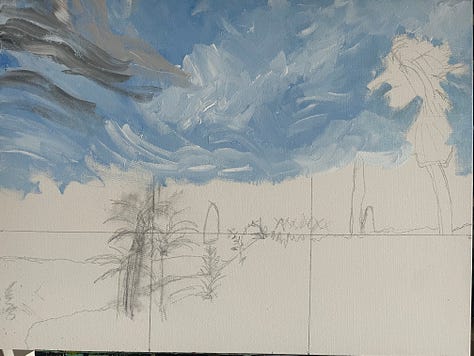
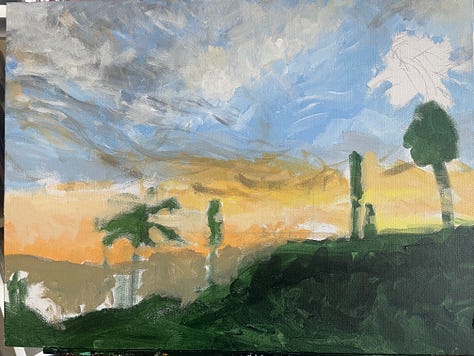

Specifically, I can lean on top-line behaviors, such as meditation, art, fellowship, exercise, and eating veggies; making sure I follow through on my commitments, like having a routine and writing this blog; also, time away from my phone, social media, and other mediums that could spark mindless engagement and intrigue, such as dating apps. All of these practices help strengthen my ability to redirect and become intentional with my focus, even if it will need to be reset time and time again.
The other key part for me is taking myself to do new things, honoring my need for a thrill, finding healthy outlets for play and safe mediums for adventure. If I have the capacity to create a life-altering fantasy about another person, I can certainly point this energy towards other endeavors—like chasing fishies!
In The Molecule of More (2018), the authors write that “dopamine isn’t the pleasure molecule… It's the anticipation molecule” (16). In other words, once we acquire what we are seeking, we are no longer receiving the gratification driven by this neurochemical. As with recovery from sex and love addiction, managing ADHD is a constant practice that comes in part from finding wholeness in solitude, in our ability to take responsibility even when our brains make it difficult, and to seek nurturing care from others—perhaps in the form of body doubling.




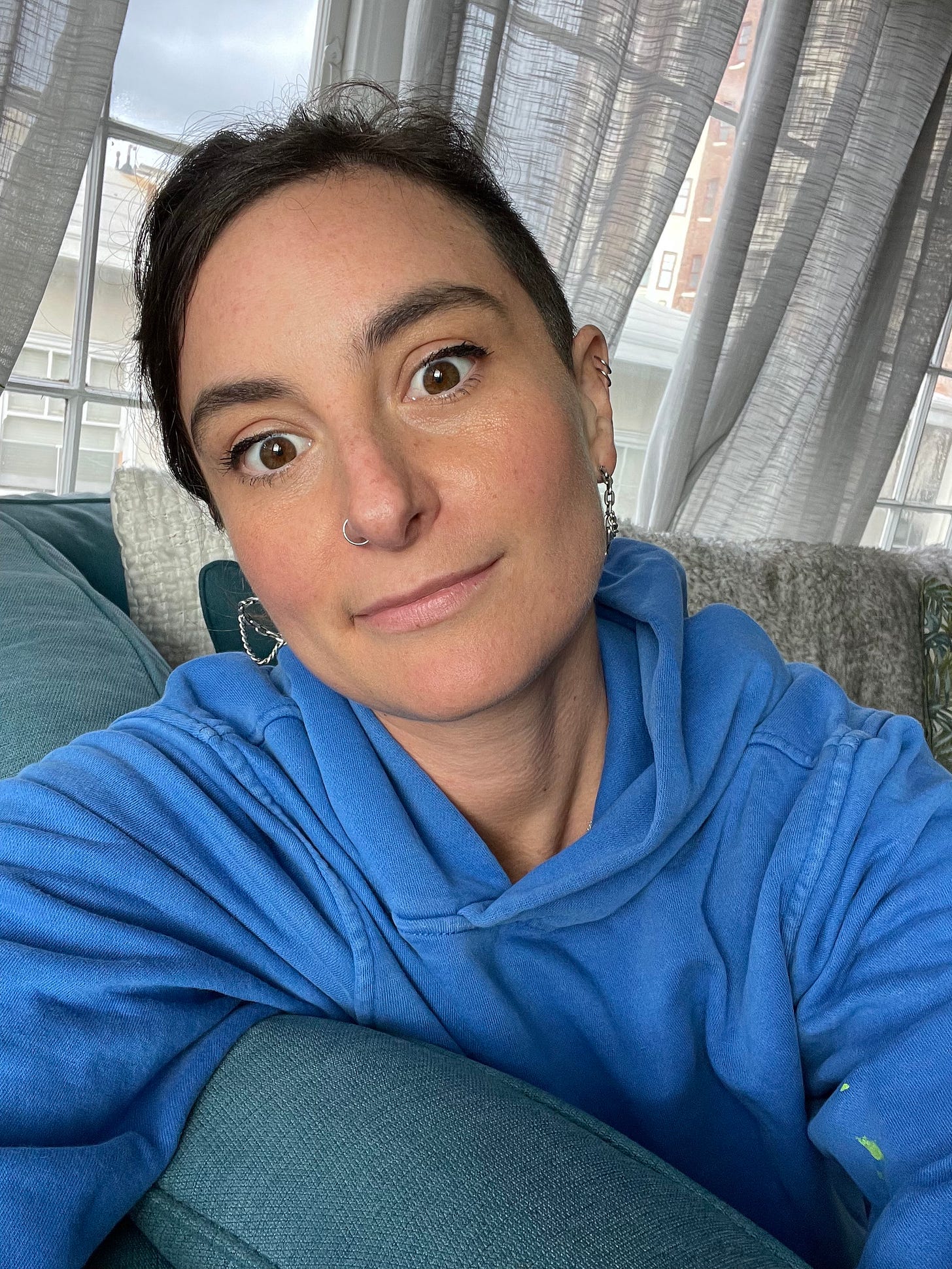
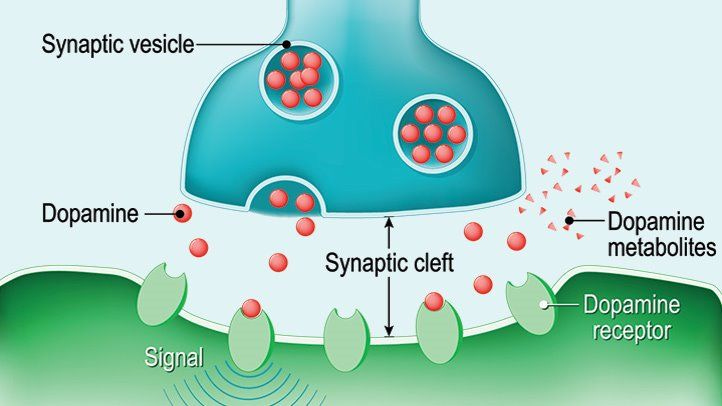

Every post I’m nodding all the way, marveling at how you organize and articulate things I’ve felt but struggle to understand much less manage. I learn so much every time. Keep informing your audience!
Never heard of the concept of Body Doubling -- that's super interesting and feels so real